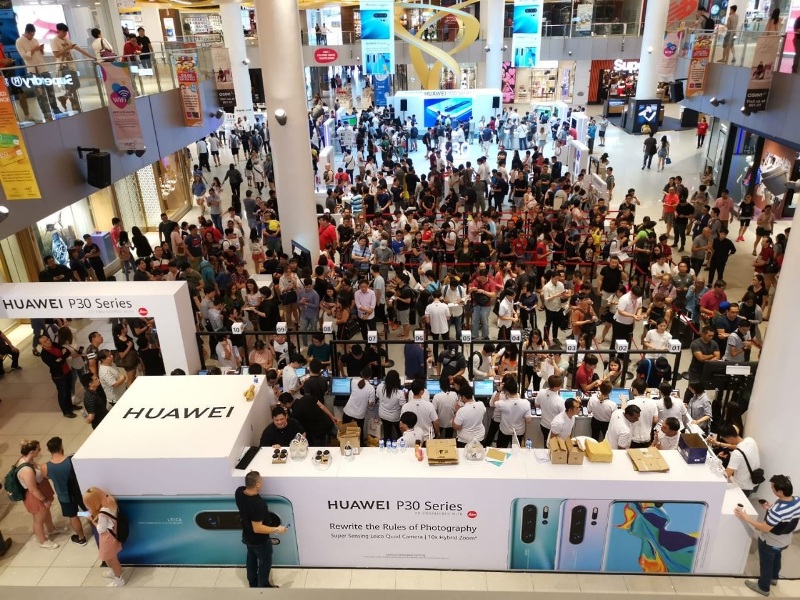The news from Sunday night that Google would be complying with a US government edict and suspending business with Huawei is one of the most dramatic moments in Android’s history. Huawei, China’s most prolific smartphone vendor, had started 2019 with explosive double-digit growth and was on a path to eclipse Samsung as the world’s number one phone maker by the year’s end. Without Google’s Android support, however, that’s simply not going to happen — not in 2019 or 2020 or any other date in the future.
Whether this proves to be the most consequential moment in Android’s history has yet to be determined. This could all be just a short-lived scare tactic from a Trump administration trying to demonstrate to the Chinese government its willingness to take drastic measures. Or Huawei might be left on the US blacklist indefinitely, spawning a wide variety of potential scenarios, none of which bode well for the company’s future as a smartphone vendor.
As things stand, Huawei is losing its licensing agreement with Google for the provision of Google Play Services and access to the Google Play Store on new Huawei Android devices. Existing customers won’t be affected, though without Google resuming business with Huawei, they also won’t get any further Android OS updates. (Honor, Huawei’s wholly owned subsidiary, looks to be subject to the same fate). This is devastating to Huawei’s hopes of selling any smartphones outside of China.
Huawei still has the option to use the open-source variety of Android, but Google has been gradually whittling all of the attractive components away from the Android Open Source Project (AOSP). The genuine full-fat Android experience of today — featuring Google Maps, YouTube, and, most crucially, the full ecosystem of third-party Android apps — is dependent on Google’s licensing assent. Deprived of Google’s software, Huawei would be selling featherless chickens to smartphone buyers used to having Play Store access. In Europe, even the finest hardware wouldn’t convince consumers to buy a phone without an app ecosystem. Google wields enormous market power through its Play Store, significant enough for the European Commission to conduct an antitrust investigation.
In its native China, Huawei already operates without the Play Store, owing to Google’s absence from the market. But even there, Huawei would suffer from not having a close working relationship with Google. All of its fellow Chinese rivals would get earlier access to the next version of Android while Huawei would have to wait for the AOSP code to be made available to the public. The Chinese consumer is probably the least sensitive to operating system updates and upgrades, given how WeChat has evolved to be an OS and ecosystem atop Android, but Huawei would still be at a disadvantage in one of the world’s most competitive phone markets.
More at https://tinyurI.com/y2op5764
Whether this proves to be the most consequential moment in Android’s history has yet to be determined. This could all be just a short-lived scare tactic from a Trump administration trying to demonstrate to the Chinese government its willingness to take drastic measures. Or Huawei might be left on the US blacklist indefinitely, spawning a wide variety of potential scenarios, none of which bode well for the company’s future as a smartphone vendor.
As things stand, Huawei is losing its licensing agreement with Google for the provision of Google Play Services and access to the Google Play Store on new Huawei Android devices. Existing customers won’t be affected, though without Google resuming business with Huawei, they also won’t get any further Android OS updates. (Honor, Huawei’s wholly owned subsidiary, looks to be subject to the same fate). This is devastating to Huawei’s hopes of selling any smartphones outside of China.
Huawei still has the option to use the open-source variety of Android, but Google has been gradually whittling all of the attractive components away from the Android Open Source Project (AOSP). The genuine full-fat Android experience of today — featuring Google Maps, YouTube, and, most crucially, the full ecosystem of third-party Android apps — is dependent on Google’s licensing assent. Deprived of Google’s software, Huawei would be selling featherless chickens to smartphone buyers used to having Play Store access. In Europe, even the finest hardware wouldn’t convince consumers to buy a phone without an app ecosystem. Google wields enormous market power through its Play Store, significant enough for the European Commission to conduct an antitrust investigation.
In its native China, Huawei already operates without the Play Store, owing to Google’s absence from the market. But even there, Huawei would suffer from not having a close working relationship with Google. All of its fellow Chinese rivals would get earlier access to the next version of Android while Huawei would have to wait for the AOSP code to be made available to the public. The Chinese consumer is probably the least sensitive to operating system updates and upgrades, given how WeChat has evolved to be an OS and ecosystem atop Android, but Huawei would still be at a disadvantage in one of the world’s most competitive phone markets.
More at https://tinyurI.com/y2op5764


